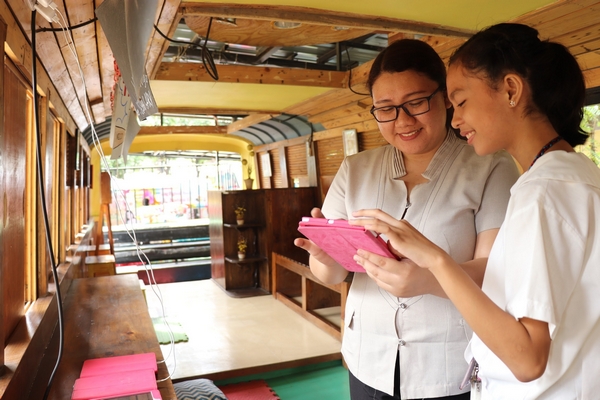
Roxanne Kwong (right), an 11-year-old grade six student in Mabolo Elementary School, says the E-Learning Center donated by Veco has helped her appreciate education even more. contributed photo
Roxanne Kwong has always been an achiever.
A grade six student at the Mabolo Elementary School (MES) in Cebu City, the 11-year-old Kwong is currently the president of her school’s Supreme Pupil Government and is vying for the highest honors in her graduating class.
Her pursuit for excellence is driven by her dream of one day becoming a flight stewardess or school teacher, two disparate career paths, but with the same aim of expanding her knowledge while helping people.
Roxanne’s desire for education burned even more fervently after the Visayan Electric Company (Veco) opened its innovative E-Learning Center at her school in February 2016.
Veco transformed an old dilapidated bus into a learning space with iPad minis, an Apple TV, and a 50-inch LED TV. Outside is an al fresco area, built with upcycled materials from Veco’s scrapyard, where teachers can opt to hold classes under the trees.
The company had hoped the E-Learning Center would become a venue for setting a different standard of learning that inspires children to stay in school and perform better. So it did.
“The E-Learning Center has helped me appreciate learning even more. I was in fourth grade when they opened it. I was very excited to use it then and I still find it useful until now,” Roxanne said.
Teacher Bonah Joy Boniel, who handles science classes for first and second graders, found that her students are more interested in her lessons when they are using the iPad minis during class.
“For example, I ask them which animals live in water and they can already search for the species via Google. Children are really visual, so this is where technology can really help,” she said.
Elbin Camposo, a grade six English teacher, uses the E-Learning Center for storytelling activities, class reporting, and other performance tasks. He said his students are “more focused” when they’re at the learning center.
Because of this facility as well as other best practices, MES has become a benchmark for academic excellence in Cebu City and other parts of the country.
Keeping children in school has always been a challenge for many academic institutions, especially amid the steady rise of dropout rates in the Philippines in recent years. But MES makes it look like a walk in the park, what with near-perfect promotion and graduation rates despite having to manage 3,378 students to date.
“Our promotion rate, which is the number of pupils in a population that move up to the next level, is at 98 percent. Our graduation rate for this school year is 99 to 100 percent,” said MES Assistant Principal Allan Gepitulan.
The promotion and graduation rates are among the key result areas evaluated by the Department of Education (DepEd) to determine whether a public school is doing well or not, helping the agency craft initiatives to help those who might be in bad shape.
Based on DepEd data, elementary dropout rates have been rising from 2007 to 2013. The elementary dropout rates for school years 2008-2009, 2009-2010, 2010-2011, 2011-2012, and 2012-2013 were 6.02 percent, 6.28 percent, 6.29 percent, 6.38 percent, and 6.81 percent, respectively.
But according to Gepitulan, MES has been “performing par excellence” for as long as he can remember.
“We do home visits to children who have stopped coming to school, we will find out what their reasons are, and we encourage them to come back. We’ve made progress in that area already, with some of those who stopped attending already coming back,” he said.
Gepitulan said that based on their interviews with children during home visits, poverty topped the list of reasons why children stop attending classes.
“Some of our students are so poor, they don’t have anything to eat for breakfast. That is why they would opt to stay at home rather than go to school,” he explained.
DepEd, in partnership with private organizations, has since addressed this problem through a regular feeding program for malnourished and undernourished children. MES, on the other hand, has constantly sought the support of the private sector in its endeavors to create a space that would encourage children to learn and hopefully keep them in school.
Through the commitment of its teachers to providing quality education as well as help from partners like Veco, MES hopes to give more students a chance at having a better future. /